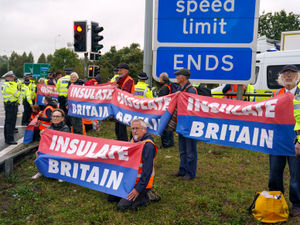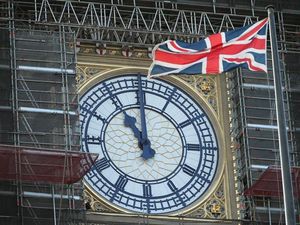VIDEO: Compulsory plastic bag charge - good or bad?
There was a time when no one would dream of going out for their weekly shops without a sturdy basket on their arm, but plastic carrier bags have become part of day-to-day life for recent generations of families.
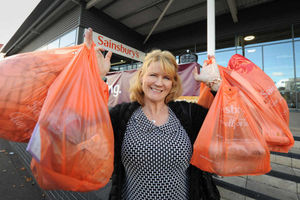
For years, shoppers had access to an endless supply of bags at supermarkets as they loaded up their trollies with multi-buy bargains.
And despite our good intentions, how many times have we all forgotten to dip into our stock of carriers at home, and ended up using just as many new ones on our next visit?
But from today, stores will have to charge 5p per bag as part of a bid to reduce the huge amount of rubbish going to landfill in this country.
How will this affect the average family?
The Government insists that long-life bags are widely available for just a few pence and will last for years.
In the case of superstores, it can be argued that people will plan their shopping trip in advance so have ample opportunity to gather the bags they need.
But it has emerged that many smaller shops are also likely to start charging, even though they do not have to.
Retailers employing fewer than 250 staff are exempt as the Government says it would be costly and unfair to impose the new rules on them - but many small shops actually want to be included.
They claim it as an opportunity to bond with customers by doing something for a good cause, because cutting bag use is good for the environment.
Supermarket shoppers will have to pay 5p for single-use carrier bags under a new law introduced in England to stem litter and help wildlife.
1. What's happening?
The Government has introduced a law requiring all supermarkets and large stores to charge a minimum of 5p for every single-use plastic carrier bag they hand out in a bid to reduce their use and the litter they cause.
2. When is the charge being brought in?
The charge comes into effect in England today.
3. Does it affect all retailers?
No. The charge applies to retailers with 250 or more full-time equivalent employees, determined by the size of the company rather than the individual branch.
Smaller businesses can charge if they wish, and the Association of Convenience Stores says it is encouraging members to introduce their own voluntary charging schemes wherever practical.
4. Are there any exemptions to the charge?
Yes. There will not be a charge for paper bags or bags from shops in airports or on trains, aircraft or ships.
Customers will not need to pay if the bag only contains certain items such as unwrapped food, raw meat and fish where there is a food safety risk, prescription medicines, uncovered blades, seeds, bulbs and flowers or live fish.
5. What about supermarket home deliveries?
Retailers must charge for plastic bags used for deliveries and online sales. Choose the bagless delivery option if one is available to avoid the charge.
Tesco has alerted its customers that unless you choose bagless delivery there will be a 40p flat charge for home shopping. Sainsbury's has also introduced a bagless delivery service, and those who do not select it will also be charged 40p per delivery.
6. What can consumers do if they do not want to pay the charge?
Shoppers can avoid the charge by using their own bags or containers.
7. Why is it being brought in?
The number of single-use carrier bags handed out by supermarkets in England rose for the fifth year in a row in 2014 to 7.6 billion, the equivalent of 140 bags per person. Campaigners warn they take 1,000 years to break down, are a highly visible type of litter.
8. Will it work?
Similar schemes in other parts of the UK have had a significant impact. The scheme in Wales – the first to come in – saw a 79 per cent reduction in plastic bags being handed out in the first three years.
Stacey Ann Hutchins, a mother of two young children, said she rarely uses supermarket plastic bags any more.
With a four-year-old son Jack, 16-month-old daughter Alice, husband Stephen, and mother Julie living with her, Stacey makes regular shopping trips but has built up a stock of recyclable bags that she takes with her.
Occasionally she has been caught out, and says she would be reluctant to pay in that situation - but she added she knows how important it is to protect the environment.

The 26-year-old, of Princess Road, Oldbury, said: "We shop mainly at Aldi, Asda and Morrisons, and Aldi have been charging 3p a bag for as long as I can remember.
"My mum always took her own bags when I was a kid so I'm used to it, but I think it will hit younger people hard who are used to popping into the shops and loading up plastic carriers.
"Being a mother, I'm usually pushing a pushchair so I keep a couple of bags in there wherever I go.
"The supermarket long-life bags are really good and most shops replace them for free if they break, so people just need to be more prepared."
Concerns have been raised over the complex guidelines that cashiers will face in deciding what constitutes a plastic bag, and when customers should be charged.
Legislation deems it must be made of plastic, be unused, have handles and be 70 microns thick or less.
The Government has defended the new charges and says it had to take action to cut landfill.
The number of bags being used plummeted by more than 70 per cent in Wales since charges started in 2011. Between £17m and £22m raised from the sales of the bags has gone to charities and other good causes.
Retailers can be fined up to £5,000 for refusing to implement the charges.
Shoppers at Sainsbury's in Wolverhampton have mixed views on the idea, with many saying the charges are simply part of modern life.
Lauren Everington, aged 24, of Stirchley in Birmingham, said: "I think it will be a change - but one for the better. I am originally from Wales where charges have already been introduced anyway, so I think it was going to be inevitable in England too.
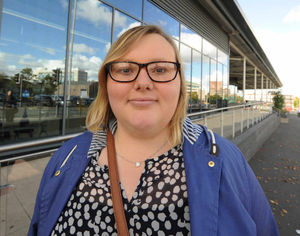
"My only concern is where the money goes afterwards. I know that some supermarkets have introduced Charitable Funds so maybe that will play a part in it. If I do a big shop anyway then I always remember to take my own bags."
And Mark Holdcroft, aged 47 from Bushbury, said it would not make any difference to his family. He added: "We always save our carrier bags anyway. I'm sure that some people will moan a bit about it, but overall its a good thing."
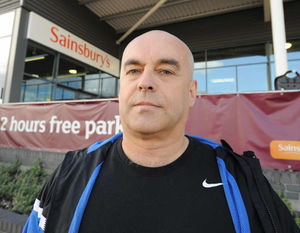
But 42-year-old Earl Edwards, aged 42, from Newhampton Road East, Whitmore Reans, said the carrier bags would not be worth paying for.
"I don't really get why we will be paying for carrier bags that only dig into your hands anyway and break quite easily - they are no good," he said.
"You already have to pay more for bigger bags so it seems odd that now they want to charge for the smaller ones too."

The charges are 'just more cost to the average everyday folk' according to Catherine Henderson, aged 52, from Dudley.
She argued: "It's not necessary when the government have taken enough off us as it is."

But Steve Mellor, aged 37, of Warstones, said shoppers should get used to buying bags for life and planning their journeys ahead.
He said: "I don't use the carrier bags that are free, I always think the bags for life are a lot better.

"If you think about it, now when everyone does a big shop it will end up being another 50 pence worth in carrier bags, so they may as well just swap to the bigger ones anyway.
"It's just another way of the government making more money out of us, they already take a lot out in tax and now they bring things in like this too."
The Department for Environment, Food and Rural Affairs (Defra) says you can receive a free plastic bag if your shopping includes items from a long list of exemptions, including uncooked fish, meat and poultry products, unwrapped blades and 'live aquatic creatures in water'.
Also included are flowers, bulbs, potatoes and prescription drugs.
A Defra spokesman said: "The new 5p charge will help us cut the number of plastic bags we use, improve the environment and put an end to the blight of bags littering our communities.
"We want to avoid imposing burdens on start-up and growing businesses in England at a time when the Government is supporting economic growth, but where possible we encourage small businesses to take voluntary action to reduce the distribution of plastic bags."
As a society we became used to the idea of going to the shops and being handed a free bag to carry our goods home in.
Of course this is a convenience and a luxury that arose relatively recently. Plenty of us remember a time when we always took our own bags and baskets with us to the greengrocers and the butchers.
A 5p charge will be a culture shock for younger people. But the runaway success of discount supermarkets such as Aldi, which charges for its carrier bags already, shows that it is not necessarily the great deterrent its rivals may fear.
And there has been no great rebellion in Wales or Scotland where plastic bag charges are now the norm.
Recycling has become part of the dogma of town halls intent on making people separate out their rubbish so they can cut their costs, without passing on the savings in the form of any discount on the council tax.
Plastic bags are not widely recycled by councils emptying the bins at the side of the road. And when they are discarded as casually as they are handed out they become a danger to animals, not to mention an unsightly blot on the landscape as they take years to decompose.
All that said, retailers who fuelled the rise in plastic bag use in order to drive their own sales are now the ones who can potentially profit from the charges.
They are encouraged to give the money they make from their 5p charges to environmental causes, yet they are under no obligation to do so.
True, the government will publish details of where the money goes, effectively naming and shaming those who do not hand it over. But in the world of retail, the price is everything.
Shoppers will always go where they get the best deal, plastic bag charge or not. This is why Aldi has been doing so well.
It has been charging a premium for its bags but its costs are significantly less than its rivals.
Consumers may well hope the larger retailers follow suit and cut their prices in order to offset the charges for the bags.
One does not have to be a cynic to know there is very little chance of that happening.
The supermarkets have this one in the bag.

